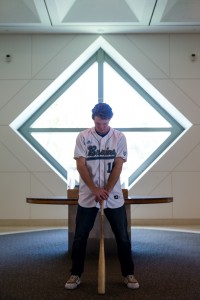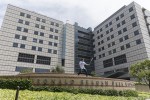Nick Kern, frail and dejected, sat up in his bed.
It was April 2016 and Kern was a familiar patient at the Ronald Reagan UCLA Medical Center. He had endured physical setbacks before – a shoulder problem forced him to give up pitching and become an infielder for UCLA baseball during his junior year.
But ulcerative colitis, an inflammatory bowel disease, was an entirely different beast.
Kern battled for months, submitting himself to surgeries and endless hours in the hospital, all while attempting to stay enrolled in courses he could never attend.
At that moment, his sickness having consumed the past six months of his life, the usually optimistic redshirt senior was hit with the unfortunate truth.
“I realized I wasn’t going to get to play baseball that year,” Kern said.
He became taciturn, mumbling to his doctors and parents. He stared at the wall the rest of the day.
All he could focus on was his comeback, when he would return to the sport he cherished for much of his life.
“Next year,” he thought.
Next year.
–––
Severe abdominal cramps and innumerable trips to the bathroom signaled that something was wrong.
Kern persevered through most weeks in his summer courses in 2015 despite the symptoms, but when finals week arrived, he couldn’t leave his house.
After several medical examinations and a trip to the emergency ward, he was diagnosed with the autoimmune disease in September.
“Your body basically thinks that your large intestine, or colon, is foreign, so your body starts attacking it,” Kern said. “It causes a ton of inflammation and you get the ulcers in there, so it causes a lot of bleeding.”
Kern suffered intense bleeding on a daily basis. Medicine that was intended to fix the issue made matters worse.
He attempted to gain enough strength to attend his fall quarter classes, but he couldn’t, and was soon placed in the hospital for treatment.
“You just circle through the cramps and the pain of all of it,” Kern said. “Everything is kind of going really quick – decreased appetite, so you shed pounds and lose weight like crazy. You’re also anemic because you’re losing all of this blood.”
By Oct. 25, Kern had faced two short stints in the hospital, underwent a surgery that removed part of his intestine and shed more than 40 pounds.
Although he was absent from school for the entire fall quarter, he did not rule out a return to baseball. He was committed to returning to full strength for his senior season.
Kern, still sparring against the intense abdominal pain, threw on his baseball pants and cleats and prepared for a routine workout with his team in January 2016.
He didn’t last more than half the practice.
“He thought he had a handle on it,” said John Kern, Nick Kern’s father. “The workouts are pretty grueling at UCLA – it took him down. It was clear he wasn’t ready.”
It wasn’t long before Nick Kern returned to Ronald Reagan UCLA Medical Center, this time for an extended stay. He was nearly immobilized, spending sleepless nights confined in the restroom and relying on his parents’ strength to walk around.
Surrounded by his family, Kern feared that he might not survive his next procedure.
“I really didn’t know if that was the last time I was going to see them again or what was going to happen,” Kern said.
He underwent two surgeries within 36 hours to have his large intestine removed, but stayed in the hospital throughout February.
His teammates helped him endure the recovery process, accompanying him on walks around the clinic and keeping him company. Senior pitcher Moises Ceja visited his teammate repeatedly.
“You could tell that he missed baseball,” Ceja said. “It was definitely difficult to see him in that position … but Nick being Nick, he was mentally strong.”
By March, Nick Kern exited the hospital. He needed just three more surgeries – six weeks in between each – before his nightmare would conclude.
But before returning to the field, the redshirt senior had to regain his physical stature. At 150 pounds, he was far from the 195-pound frame he wanted by fall.
Kern didn’t need a slew of personal fitness trainers and shelves full of supplements. All he needed was UCLA nutritionist Beth Miller and some determination.
“It was a lot (of) trial and error and sometimes that trial is very painful,” Miller said. “But he was really disciplined and he has it down to a science. He has his Nick Kern equation essentially.”
Off the field, he motored through three to four workouts a day and a strict weight-gain diet. On the field, he split his time between two different summer-league teams – the Santa Barbara Foresters and the San Diego Invaders.
“He just looked at it as if that’s more at bats, more opportunities … just so he could get back up to speed as fast as he could,” said Katie Kern, Nick Kern’s mother. “He was that determined to get his body physically back in there once he was given the green light.”
Nervous to see the number that would appear, Nick Kern placed his feet on the weight scale the first day of fall quarter this year.
193.
Nick Kern was back.

Although he didn’t play during the first month of the season, his time came in March following a hand injury to starting redshirt sophomore shortstop Nick Valaika.
“To his credit, he was more than ready,” said coach John Savage. “We knew he’d be ready. He’s a very diligent guy, very self-motivated. … He has that certain edge to him, he’s competitive, he likes challenges – he almost likes to be told he can’t do it in a different way.”
Though he didn’t stick as the everyday shortstop for the Bruins, he’s contributed when he’s needed to.
Just ask No. 1 Oregon State’s closer Jake Mulholland, who served up a game-tying two-run homer to Kern in the ninth inning April 21.
Nevertheless, whether it’s a clutch pinch hit or a high-quality defensive play, each moment on the field is now a special one for Nick Kern and his family.
“Every time I see him on the field I get a little starry-eyed,” John Kern said. “I was with him a lot in the hospital, I watched him suffer. I was trying to reassure him, ‘You know you’re going to get through this, you’re going to get back on the field,’ but there were some moments where I wasn’t sure.”
–––
Nick Kern, healthy and cheerful, sat up in his chair in the J.D. Morgan Center, reminiscing about his baseball career.
Kern’s teammates consistently jab “grandpa” jokes at the infielder – the last remaining member of the 2013 national championship team.
His baseball career and life were in jeopardy a year ago. But despite his comeback, he hasn’t erased the physical and mental trauma from his memory.
“I get some flashbacks of where I was last year and definitely get hit in the feels a little bit,” Kern said. “Before, it was so easy to take for granted and be so focused on what you’re doing, but I definitely gained perspective and it allowed me to step back and take it all in.”
He prevailed against six surgeries, more than 50 days of hospitalization and a year’s supply of abdominal pain. His story resonated with teammates and his coaches alike.
“Every great comeback requires great deficit.”
That’s the personal motto Kern referred to when describing his journey back to baseball.
After looking back at all he endured, the baseball player still recollects on his experiences in a positive way.
“I always believed I was going to come back and play baseball again,” Kern said. “I definitely had that determination that even when things were going bad, it was just part of the deficit.”
And that deficit sparked one great comeback.
